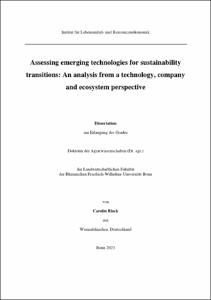Block, Carolin: Assessing emerging technologies for sustainability transitions : An analysis from a technology, company and ecosystem perspective. - Bonn, 2023. - Dissertation, Rheinische Friedrich-Wilhelms-Universität Bonn.
Online-Ausgabe in bonndoc: https://nbn-resolving.org/urn:nbn:de:hbz:5-71102
Online-Ausgabe in bonndoc: https://nbn-resolving.org/urn:nbn:de:hbz:5-71102
@phdthesis{handle:20.500.11811/10914,
urn: https://nbn-resolving.org/urn:nbn:de:hbz:5-71102,
author = {{Carolin Block}},
title = {Assessing emerging technologies for sustainability transitions : An analysis from a technology, company and ecosystem perspective},
school = {Rheinische Friedrich-Wilhelms-Universität Bonn},
year = 2023,
month = jun,
note = {Understanding the role of technological innovations has always been a central concern of strategic management research. Specifically, to address the current challenges of the 21st century, such as climate change or environmental degradation, new technologies, in particular sustainability-oriented technologies (SOTs), are emerging. However, in the case of emerging SOTs that are often interdisciplinary, potentially induce systemic changes and are in strong competition with prevailing, less sustainable technologies, technology assessment and technology commercialization are challenging. As industry plays an important role in identifying and evaluating emerging SOTs, it is important to better understand industry stakeholders’ perceptions and to support them in driving sustainability transitions with the help of technological innovations. Thus, this thesis is motivated by the main goal to foster the transfer of emerging SOTs from science to industry to eventually contribute to the transition of current business towards greater ecological sustainability. In order to achieve this objective and given that technology assessment requires different perspectives, this dissertation conducts three empirical studies focusing the a) technology, b) company, and c) ecosystem perspective.
The thesis contributes to sustainability transition literature by providing, first, a conceptual framework for relevant selection criteria of SOTs from a value chain spanning perspective, second, areas of coherence vs. noncoherence in technology evaluation across different value chain actors and third, evidence that competitive advantages within business ecosystems rely on a company’s ability to connect to other actors and to complement own resources, while eventually contributing to an overall ecosystem value proposition. Results show that regulatory certainty and planning security regarding the economic viability of the technology, independent of subsidies and, in the event of changing regulations are important aspects to be considered regarding the regulatory framework of SOTs. In addition, results allow for stakeholder targeted support initiatives to facilitate the technology transfer in the context of sustainability transitions.},
url = {https://hdl.handle.net/20.500.11811/10914}
}
urn: https://nbn-resolving.org/urn:nbn:de:hbz:5-71102,
author = {{Carolin Block}},
title = {Assessing emerging technologies for sustainability transitions : An analysis from a technology, company and ecosystem perspective},
school = {Rheinische Friedrich-Wilhelms-Universität Bonn},
year = 2023,
month = jun,
note = {Understanding the role of technological innovations has always been a central concern of strategic management research. Specifically, to address the current challenges of the 21st century, such as climate change or environmental degradation, new technologies, in particular sustainability-oriented technologies (SOTs), are emerging. However, in the case of emerging SOTs that are often interdisciplinary, potentially induce systemic changes and are in strong competition with prevailing, less sustainable technologies, technology assessment and technology commercialization are challenging. As industry plays an important role in identifying and evaluating emerging SOTs, it is important to better understand industry stakeholders’ perceptions and to support them in driving sustainability transitions with the help of technological innovations. Thus, this thesis is motivated by the main goal to foster the transfer of emerging SOTs from science to industry to eventually contribute to the transition of current business towards greater ecological sustainability. In order to achieve this objective and given that technology assessment requires different perspectives, this dissertation conducts three empirical studies focusing the a) technology, b) company, and c) ecosystem perspective.
The thesis contributes to sustainability transition literature by providing, first, a conceptual framework for relevant selection criteria of SOTs from a value chain spanning perspective, second, areas of coherence vs. noncoherence in technology evaluation across different value chain actors and third, evidence that competitive advantages within business ecosystems rely on a company’s ability to connect to other actors and to complement own resources, while eventually contributing to an overall ecosystem value proposition. Results show that regulatory certainty and planning security regarding the economic viability of the technology, independent of subsidies and, in the event of changing regulations are important aspects to be considered regarding the regulatory framework of SOTs. In addition, results allow for stakeholder targeted support initiatives to facilitate the technology transfer in the context of sustainability transitions.},
url = {https://hdl.handle.net/20.500.11811/10914}
}






